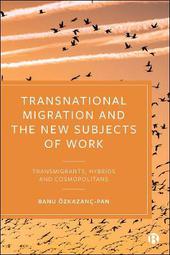
|
Transnational Migration and the New Subjects of Work: Transmigrants, Hybrids and Cosmopolitans
Paperback / softback
Main Details
| Title |
Transnational Migration and the New Subjects of Work: Transmigrants, Hybrids and Cosmopolitans
|
| Authors and Contributors |
By (author) Banu OEzkazanc-Pan
|
| Physical Properties |
| Format:Paperback / softback | | Pages:174 | | Dimensions(mm): Height 234,Width 156 |
|
| Category/Genre | Organizational theory and behaviour |
|---|
| ISBN/Barcode |
9781529204599
|
| Classifications | Dewey:304.8 |
|---|
| Audience | | Tertiary Education (US: College) | | Professional & Vocational | |
|---|
| Illustrations |
No
|
|
Publishing Details |
| Publisher |
Bristol University Press
|
| Imprint |
Bristol University Press
|
| Publication Date |
17 March 2021 |
| Publication Country |
United Kingdom
|
Description
In an increasingly globalised world, mobility is a new defining feature of our lives, livelihoods and work experiences. This book is a first in utilising transnational migration studies as a new theoretical framework in management and organisation studies. OEzkazanc-Pan presents a much-needed new concept for understanding people, work and organisations in a world on the move, while focusing on growing inequality associated with work in changing societies.
Author Biography
Joint Editor-in-Chief of the journal Gender, Work and Organization, Banu OEzkazanc-Pan is Associate Professor of Management and Entrepreneurship at the University of Massachusetts and visiting Associate Professor at Brown University.
Reviews"Reading OEzkazanc-Pan's book, in times of COVID-19, made me reflect once again on our role as critical scholars; our obligation to challenge bounded subjectivities in the context of an increasingly globalized world; and simultaneously to examine how individual experiences around inequality need to define our study of the mobile body-in-the world, and the contexts in which we negotiate our translocal identities. Organization The most important contribution of this book, for me, is its analysis of mainstream diversity research. The author clearly reveals its limitations both in general and, in particular, when it comes to transmigrants. Gender, Work and Organization
|